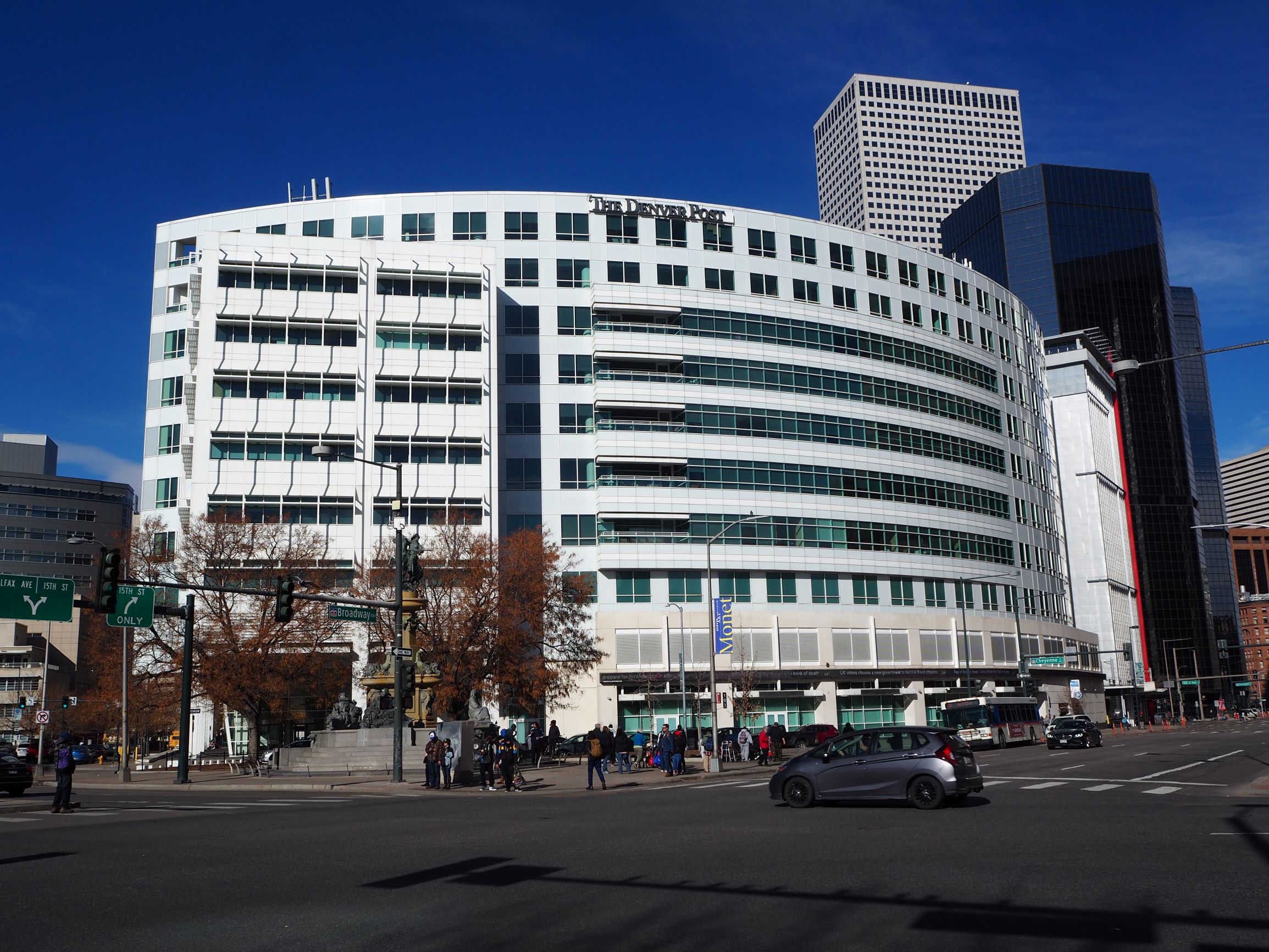
The building at 101 W. Colfax Ave. opened in 2006. (BusinessDen file)
The Denver City Council on Tuesday postponed a vote on whether to buy the former Denver Post building downtown after multiple members said they still had questions about the deal.
Mayor Mike Johnston’s administration wants to pay $88.5 million, or about $290 a square foot, for the 11-story, 305,000-square-foot office building at 101 W. Colfax Ave.
The deal, which city staff began discussing while Michael Hancock was still mayor, would allow for future expansion of the district, county, probate and juvenile courts.
The council had been scheduled to make a decision on the deal Tuesday. But 15 minutes through discussion, Councilwoman Sarah Parady floated pushing the final vote to Jan. 16, which was later agreed upon.
“I’m hearing a lot of questions. I have a lot of questions,” Parady told Lisa Lumley, the city’s real estate director. “Not for lack of you answering, but we keep kind of going back and forth and doing this iterative thing, and I have some things I’d like to follow up on.”
The structure, completed in 2006, was custom-developed for The Denver Post and Rocky Mountain News, the city’s two dominant newspapers at the time. Then the newspaper industry cratered. The Rocky folded in 2009. The Post moved operations out several years ago, but has a lease for the building through 2029. It has been subleasing the office space to a number of tenants, including the city.
The building has been owned since 2006 by an affiliate of New York-based American Properties, which paid $93.42 million for it, records show. The structure is next to the Wellington Webb Municipal Building and a short walk from other city and county buildings.

Shontel Lewis
At the Tuesday meeting, Councilwoman Shontel Lewis, who told BusinessDen in early December that she would vote no, indicated her position hadn’t changed.
“I just do not think we are utilizing our dollars in this particular case in the best ways, considering the myriad issues … particularly around the unhoused but also around the migrant crisis,” Lewis said. “And so I understand the need for this; I do not understand the urgency as it’s been presented currently for an investment of $88 million.”
Lumley stressed that a city master plan calls for the court system to have more space — some 170,000 square feet by 2030 — and said that date is not far off.
“For us to achieve that, to work with architects, do the design, the plans and then do the construction — I’m actually worried that we’re already behind,” Lumley said.
But Lewis wasn’t the only one raising eyebrows at the deal. Several council members noted that the city last year leased multiple floors at the top of Republic Plaza for the Denver District Attorney’s Office.

Flor Alvidrez
“Why did we lease so much space in downtown Denver just to purchase more space in downtown Denver now?” Councilwoman Flor Alvidrez asked.
The deal, Alvidrez said, “just doesn’t make sense,” referencing the fact that office space is hardly in high demand. The deal comes at a time when downtown has 30 percent vacancy and some office landlords are defaulting on their loans.
“This is what we anticipate going down in value in the future, so we could get actually a better price on this in the future,” Alvidrez said. “I’m concerned about the amount of real estate that we’re buying as the city in general.”
Lumley noted that, even if the city buys the building, it can’t simply start using vacant space due to the existing Post lease.
“The Denver Post building, while there may be some space available, the city does not control that building right now,” Lumley said. “That would be The Denver Post. So I will tell you that, if we were to lease The Denver Post today, all things being equal, we would actually be paying more money there — and not realizing anything, just paying more money there — versus what we were able to get through an RFP process for the Republic Plaza.”
Parady, meanwhile, said she wanted to see projections about space needs from back when the Lindsey-Flanigan Courthouse was being built less than two decades ago.
“It is interesting to me that we built this new complex so recently and we’re already needing more space for the courts,” Parady said.
Parady also asked whether the deal was about propping up a struggling downtown.
“When we talked about Republic Plaza, we talked about in part we were making a policy decision to intentionally kind of invest in downtown. Is that part of what’s going on with the Post building as well?” she asked.
Lumley responded: “No … that was specific to the swing space, for just a very limited period of time. For this, this is truly just a need-driven requirement.”

The building at 101 W. Colfax Ave. opened in 2006. (BusinessDen file)
The Denver City Council on Tuesday postponed a vote on whether to buy the former Denver Post building downtown after multiple members said they still had questions about the deal.
Mayor Mike Johnston’s administration wants to pay $88.5 million, or about $290 a square foot, for the 11-story, 305,000-square-foot office building at 101 W. Colfax Ave.
The deal, which city staff began discussing while Michael Hancock was still mayor, would allow for future expansion of the district, county, probate and juvenile courts.
The council had been scheduled to make a decision on the deal Tuesday. But 15 minutes through discussion, Councilwoman Sarah Parady floated pushing the final vote to Jan. 16, which was later agreed upon.
“I’m hearing a lot of questions. I have a lot of questions,” Parady told Lisa Lumley, the city’s real estate director. “Not for lack of you answering, but we keep kind of going back and forth and doing this iterative thing, and I have some things I’d like to follow up on.”
The structure, completed in 2006, was custom-developed for The Denver Post and Rocky Mountain News, the city’s two dominant newspapers at the time. Then the newspaper industry cratered. The Rocky folded in 2009. The Post moved operations out several years ago, but has a lease for the building through 2029. It has been subleasing the office space to a number of tenants, including the city.
The building has been owned since 2006 by an affiliate of New York-based American Properties, which paid $93.42 million for it, records show. The structure is next to the Wellington Webb Municipal Building and a short walk from other city and county buildings.

Shontel Lewis
At the Tuesday meeting, Councilwoman Shontel Lewis, who told BusinessDen in early December that she would vote no, indicated her position hadn’t changed.
“I just do not think we are utilizing our dollars in this particular case in the best ways, considering the myriad issues … particularly around the unhoused but also around the migrant crisis,” Lewis said. “And so I understand the need for this; I do not understand the urgency as it’s been presented currently for an investment of $88 million.”
Lumley stressed that a city master plan calls for the court system to have more space — some 170,000 square feet by 2030 — and said that date is not far off.
“For us to achieve that, to work with architects, do the design, the plans and then do the construction — I’m actually worried that we’re already behind,” Lumley said.
But Lewis wasn’t the only one raising eyebrows at the deal. Several council members noted that the city last year leased multiple floors at the top of Republic Plaza for the Denver District Attorney’s Office.

Flor Alvidrez
“Why did we lease so much space in downtown Denver just to purchase more space in downtown Denver now?” Councilwoman Flor Alvidrez asked.
The deal, Alvidrez said, “just doesn’t make sense,” referencing the fact that office space is hardly in high demand. The deal comes at a time when downtown has 30 percent vacancy and some office landlords are defaulting on their loans.
“This is what we anticipate going down in value in the future, so we could get actually a better price on this in the future,” Alvidrez said. “I’m concerned about the amount of real estate that we’re buying as the city in general.”
Lumley noted that, even if the city buys the building, it can’t simply start using vacant space due to the existing Post lease.
“The Denver Post building, while there may be some space available, the city does not control that building right now,” Lumley said. “That would be The Denver Post. So I will tell you that, if we were to lease The Denver Post today, all things being equal, we would actually be paying more money there — and not realizing anything, just paying more money there — versus what we were able to get through an RFP process for the Republic Plaza.”
Parady, meanwhile, said she wanted to see projections about space needs from back when the Lindsey-Flanigan Courthouse was being built less than two decades ago.
“It is interesting to me that we built this new complex so recently and we’re already needing more space for the courts,” Parady said.
Parady also asked whether the deal was about propping up a struggling downtown.
“When we talked about Republic Plaza, we talked about in part we were making a policy decision to intentionally kind of invest in downtown. Is that part of what’s going on with the Post building as well?” she asked.
Lumley responded: “No … that was specific to the swing space, for just a very limited period of time. For this, this is truly just a need-driven requirement.”


